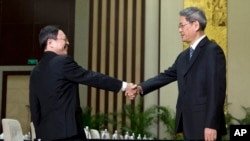Cross-strait relations between China and Taiwan have embarked on "a fast-track to development," according China's state-run Global Times today.
The Chinese news agency Xinhua says last week's first-ever formal meeting between the two cross-straits affairs offices in Nanjing signaled relations have "entered a new chapter."
VOA’s Victor Beattie asked regional political analysts for an assessment of the relationship. He spoke with professors Joseph Cheng of Hong Kong City University and Jean-Pierre Cabestan of Hong Kong Baptist University, and William Sharp at Hawaii-Pacific University:
BEATTIE: Where do you see the recent talks leading?
CHENG: The major objective on the part of both parties is to have a meeting between President Ma Ying-jeou and President Xi Jinping at the APEC meeting to be held in Beijing in October.
BEATTIE: The official of China’s government indicated that such an APEC meeting between the two leaders would be considered inappropriate.
CHENG: Both parties intend to engage in some kind of bargaining. Beijing says an informal summit would be inappropriate because of the potential of creating the image of equal, state-to-state relations. But Taiwan has important elections coming in November, and with the ruling Nationalist Party losing popularity, Beijing may feel it has a dwindling window of opportunity to achieve a reconciliation before the political debate begins.
SHARP: The Nationalist Party is not doing well. They know it and the mainland knows it. They see their chances for ultimate unification better being served while the Nationalist Party is in power. The prospect of a meeting between the Chinese and Taiwanese presidents would serve the Nationalists well.
BEATTIE: What would be the the importance and the symbolism of such a meeting?
CABESTAN: Well of course the symbolism is very, very important in the sense that it would be a strong message to the world that Taipei and Beijing have reconciled, they have reached consensus in spite of their differences on many issues. And, that would also sort of constrain any subsequent leader of Taiwan to follow the same path, even if someone from the opposition party was elected president of Taiwan.
BEATTIE: So these meetings between Taiwan and Chinese officials will really have no bearing on cross-Strait relations for the present time?
SHARP: They’re bound to have some impact, but I think it’s fairly minimal. There is always the possibility of Taiwan establishing a de facto consulate on the mainland and the mainland establishing the same on Taiwan. There’s also talk about offering more medical services to two mainland students in Taiwan. Things like this could possibly happen.
CABESTAN: For President Xi, in the middle of an environment that is more tense with Japan and other Southeast Asian countries, the benefit of pursuing reconciliation with Taiwan is that it shows China can produce change and can develop a civilized relationship even with an historic foe.
The Chinese news agency Xinhua says last week's first-ever formal meeting between the two cross-straits affairs offices in Nanjing signaled relations have "entered a new chapter."
VOA’s Victor Beattie asked regional political analysts for an assessment of the relationship. He spoke with professors Joseph Cheng of Hong Kong City University and Jean-Pierre Cabestan of Hong Kong Baptist University, and William Sharp at Hawaii-Pacific University:
BEATTIE: Where do you see the recent talks leading?
CHENG: The major objective on the part of both parties is to have a meeting between President Ma Ying-jeou and President Xi Jinping at the APEC meeting to be held in Beijing in October.
BEATTIE: The official of China’s government indicated that such an APEC meeting between the two leaders would be considered inappropriate.
CHENG: Both parties intend to engage in some kind of bargaining. Beijing says an informal summit would be inappropriate because of the potential of creating the image of equal, state-to-state relations. But Taiwan has important elections coming in November, and with the ruling Nationalist Party losing popularity, Beijing may feel it has a dwindling window of opportunity to achieve a reconciliation before the political debate begins.
SHARP: The Nationalist Party is not doing well. They know it and the mainland knows it. They see their chances for ultimate unification better being served while the Nationalist Party is in power. The prospect of a meeting between the Chinese and Taiwanese presidents would serve the Nationalists well.
BEATTIE: What would be the the importance and the symbolism of such a meeting?
CABESTAN: Well of course the symbolism is very, very important in the sense that it would be a strong message to the world that Taipei and Beijing have reconciled, they have reached consensus in spite of their differences on many issues. And, that would also sort of constrain any subsequent leader of Taiwan to follow the same path, even if someone from the opposition party was elected president of Taiwan.
BEATTIE: So these meetings between Taiwan and Chinese officials will really have no bearing on cross-Strait relations for the present time?
SHARP: They’re bound to have some impact, but I think it’s fairly minimal. There is always the possibility of Taiwan establishing a de facto consulate on the mainland and the mainland establishing the same on Taiwan. There’s also talk about offering more medical services to two mainland students in Taiwan. Things like this could possibly happen.
CABESTAN: For President Xi, in the middle of an environment that is more tense with Japan and other Southeast Asian countries, the benefit of pursuing reconciliation with Taiwan is that it shows China can produce change and can develop a civilized relationship even with an historic foe.




